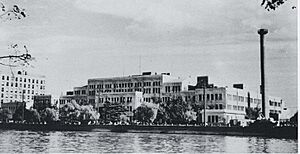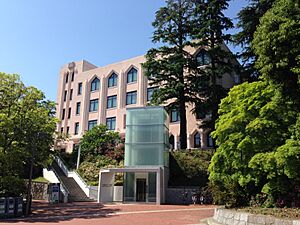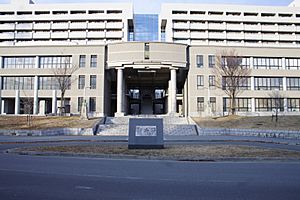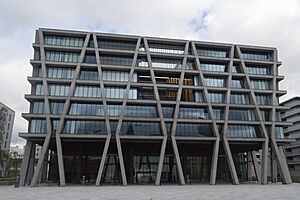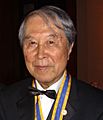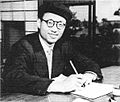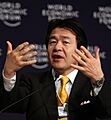University of Osaka facts for kids
|
大阪大学
|
|
 |
|
| Motto | 地域に生き世界に伸びる |
|---|---|
|
Motto in English
|
Live Locally, Grow Globally |
| Type | Public (National) |
| Established | Kaitokudo founded 1724; Osaka Imperial University established 1931 |
| Budget | 186.718 billion yen (2023) |
| President | Shojiro Nishio |
|
Academic staff
|
3,357 |
|
Administrative staff
|
3,672 |
| Students | 23,226 |
| Undergraduates | 15,075 |
| Postgraduates | 8,151 |
| 3,374 | |
|
Other students
|
537 (research students and auditors) |
| Location |
Toyonaka/Suita/Minoh
,
,
|
| Campus | Suburban, 1.58 km² |
| Authorized Student Groups | 59 sports-related, 70 culture-related |
| Colors | Sky blue |
| Mascot | Dr. Wani |
 |
|
The University of Osaka (大阪大学, Ōsaka daigaku), also known as UOsaka or Handai (阪大), is a big research university in Osaka, Japan. It's a national university, meaning it's supported by the government.
This university has a long history, going back to schools from the Edo period (1603-1868). It officially became a university in 1931. Over the years, it grew by joining with other schools. In 2007, it merged with the Osaka University of Foreign Studies, becoming the largest national university in Japan for undergraduate students.
Many famous people have studied or worked at UOsaka. These include Hideki Yukawa, who won the Nobel Prize in Physics, and Osamu Tezuka, a famous manga artist.
Contents
History of the University of Osaka
The University of Osaka's roots go way back to two old schools. One was the Kaitokudō (懐徳堂), a school for local people started in 1724. The other was the Tekijuku (適塾), a school for samurai founded in 1838 by Ogata Kōan. These old schools helped shape the university's focus on both humanities (like history and literature) and sciences.
The modern university began in 1869 as the Osaka Prefectural Medical School. It became the Osaka Prefectural Medical College in 1919. In 1931, this Medical College joined with a new College of Science to form Osaka Imperial University. This was the sixth "imperial university" in Japan. Two years later, the Osaka Technical College joined, becoming the School of Engineering. In 1947, the university's name changed to Osaka University.
After World War II, in 1949, UOsaka merged with two high schools. It then had five main study areas: Science, Medicine, Engineering, Letters (like literature), and Law. Since then, it has added many new departments and research centers. For example, it opened Japan's first School of Engineering Science.
In 2007, UOsaka merged with the Osaka University of Foreign Studies. This made UOsaka one of only two national universities in Japan with a School of Foreign Studies. This merger also made UOsaka the biggest national university in the country.
University Campuses
The University of Osaka has three main campuses: Toyonaka, Suita, and Minoh. Each campus focuses on different subjects and activities.
Toyonaka Campus
The Toyonaka campus is where students study subjects like Humanities, Law, Economics, Science, and Engineering Science. It's also where all first-year undergraduate students attend classes. Most sports activities happen here.
Suita Campus
The Suita campus is home to subjects like Human Sciences, Medicine, Dentistry, Pharmaceutical Sciences, and Engineering. The University of Osaka Hospital is also located on this campus. It's a major center for medical and scientific research.
Minoh Campus
The Minoh campus joined UOsaka in 2007. This campus is where students can study different foreign languages and cultures. It has the School of Foreign Studies and centers for learning Japanese language and culture.
There was also an older campus in downtown Osaka called Nakanoshima. It used to be the main place for the medical faculty. After the medical facilities moved to the Suita campus in 1993, the Nakanoshima campus became a center for public events and adult education classes.
What You Can Study
The University of Osaka has many different schools for students. It has 11 undergraduate schools for students starting their university journey and 15 graduate schools for those who want to continue their studies after their first degree.
Some of the undergraduate schools include:
- Letters (for subjects like literature and history)
- Human Sciences (studying people and society)
- Foreign Studies (learning languages and cultures)
- Law
- Economics
- Science
- Medicine
- Dentistry
- Pharmaceutical Sciences
- Engineering
- Engineering Science
UOsaka also has 21 research institutes, 4 libraries, and 2 university hospitals.
English Programs
UOsaka offers some programs taught entirely in English. The School of Human Sciences on the Suita Campus has a four-year undergraduate program in English. This program started in 2011 and focuses on subjects like sociology, anthropology, and psychology. It attracts students from all over the world.
There's also an English program for graduate students in Global Japanese Studies.
University Partnerships
The University of Osaka works with many universities around the world. They have agreements to exchange students and researchers, and to do joint research projects. This means UOsaka students can sometimes study abroad at these partner universities without paying extra tuition to the host school.
As of May 2024, UOsaka has 156 agreements with other universities and 651 agreements between specific departments or schools. Some of their partners include famous universities like Cornell University, Harvard University, and Stanford University in the United States, and the University of Oxford in the United Kingdom.
University Rankings
| THE National | General | 3 | |
|---|---|---|---|
| QS Asia (Asia version) |
General | =32 | |
| THE Asia (Asia version) |
General | =27 | |
| THE World | General | 162 | |
| QS World | General | 91 | |
| ARWU World | Research | 151–200 | |
Overall Rankings
The University of Osaka is known as a top university. It consistently ranks high both in Japan and globally.
- In the 2024 QS World University Rankings, UOsaka was ranked 80th in the world and 3rd in Japan.
- In the 2024 Times Higher Education World University Rankings, it was ranked 175th globally.
UOsaka is also a strong research university. It was ranked 2nd in Japan and 22nd worldwide for innovation by Thomson Reuters.
Subject Rankings
UOsaka is especially strong in certain study areas:
- Immunology: 1st in Japan, 4th globally.
- Material Science: 4th in Japan, 15th globally.
- Chemistry: 5th in Japan, 14th globally.
In the Nature Index 2024, which looks at research output in top science journals, UOsaka was ranked 34th globally and 3rd in Japan.
|
|
||||||||||||||||||||||||||||||||||||||||||||||||||||||||||||||||||||||||||||||||||||||||||||||||||||||||||||||||||||||||||||||||||||||||||||||||||||||||||||||||||||||||||||||||||||||||||||||||||||||||||||
How Hard Is It to Get In?
The University of Osaka is one of the most selective universities in Japan. This means it's quite competitive to get accepted. It is usually ranked just after the very top universities in Japan, like the University of Tokyo and Kyoto University.
Sports and Activities
The University of Osaka has regular sports competitions with Nagoya University each year. They also have windsurfing competitions with Kyoto University, Kobe University, and Taiwan's National Sun Yat-sen University.
Famous People from UOsaka
Many notable people have studied or taught at the University of Osaka.
Scientists and Researchers
-
Hideki Yukawa, won the 1949 Nobel Prize in Physics
-
Yoichiro Nambu, won the 2008 Nobel Prize in Physics
-
Akira Yoshino, won the 2019 Nobel Prize in Chemistry
-
Osamu Hayaishi, won the 1986 Wolf Prize in Medicine
-
Tadamitsu Kishimoto, 14th President of OU, won the 2009 Crafoord Prize
-
Toshio Hirano, 17th President of OU, won the 2009 Crafoord Prize
-
Kiyoshi Nagai, a biologist at the MRC Laboratory of Molecular Biology
-
Shimon Sakaguchi, won the 2015 Gairdner Award and 2017 Crafoord Prize
-
Pratiwi Sudarmono, an Indonesian microbiologist
-
Masatoshi Gündüz Ikeda, a Turkish mathematician of Japanese background
-
Mohamed Yakub Janabi, Regional Director for the WHO Regional Office for Africa
- Shoichi Sakata, a physicist known for the Sakata model.
- Takeo Matsubara, a physicist at Kyoto University.
- Yoshiaki Arata, a pioneering researcher in nuclear fusion.
- Sonia Contera, a Spanish physicist at the University of Oxford.
- Satoshi Kawata, a scientist in nanotechnology and photonics.
- Tadao Kasami, an information theorist and IEEE Fellow.
- Kilnam Chon, a South Korean computer scientist.
- Li Siguang, a Chinese geologist and politician.
- Yoshio Okamoto, a Japanese chemist who won the 2019 Japan Prize.
- Toshio Yanagida, a Japanese biophysicist.
- Yoshizumi Ishino, a Japanese molecular biologist who discovered the DNA sequence of CRISPR.
- Yusuke Nakamura, a prominent Japanese geneticist and cancer researcher.
- Toru Kumon, a Japanese mathematics educator who developed the Kumon method.
Business and Arts
-
Akio Morita, co-founder of Sony
-
Masataka Taketsuru, known as the father of Japan's whisky industry
-
Osamu Tezuka, a famous Japanese manga artist and animator
-
Ryōtarō Shiba, one of the most important writers in modern Japan
- Kunio Nakamura, a businessman who was the president of Panasonic.
- Takamitsu Azuma, an architect and professor at UOsaka.
- Seishi Yokomizo, a novelist who created the detective Kosuke Kindaichi.
- Toshio Masuda, a film director.
- Junzo Shono, a Japanese novelist who won the 1954 Akutagawa Prize.
- Chin Shunshin, a Taiwanese-Japanese novelist.
- Koushun Takami, a journalist and author of Battle Royale.
- Taku Mayumura, a Japanese novelist and science fiction writer.
Politics
-
Shinji Tarutoko, a former member of the House of Representatives
- Shuzen Tanigawa, a Japanese politician.
- Satoshi Umemura, a Japanese politician.
- Mitsuo Mitani, a Japanese politician.
- Ko Ko Oo, a former Minister of Science and Technology of Burma.
- Fathimath Dhiyana Saeed, a former Secretary-General of SAARC.
See also
 In Spanish: Universidad de Osaka para niños
In Spanish: Universidad de Osaka para niños
 | Audre Lorde |
 | John Berry Meachum |
 | Ferdinand Lee Barnett |


